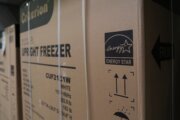WASHINGTON — Metro will immediately remove all 4000-series rail cars off its tracks because of a potential safety concern, the transit agency announced Thursday.
While Metro said in a statement that the risk is “remote,” rail car engineers said they believe the trains could show incorrect speed commands to train operators, which in the worst-case scenario could lead to a crash similar to the deadly 2009 Red Line collision near Fort Totten.
Train operators are supposed to follow speed commands, which indicate the maximum speed they are allowed to travel. A failure in the system could keep those speed commands from dropping to zero when there is a train on the tracks ahead.
“Today’s action is being taken in an abundance of caution and, while we believe that the risk is small, it is a risk I am unwilling to take,” Metro General Manager Paul J. Wiedefeld said in a news release.
The 4000-series fleet, Metro’s smallest, had 82 cars — out of a total fleet of 1,212.
The decision to remove the trains was apparently made hastily, with no mention of the issue at Thursday’s Metro Board meeting. Rail car engineers told Chief Safety Officer Pat Lavin about the issue around 2 p.m. Thursday and he told Wiedefeld around 2:45 p.m. before a 3 p.m. decision was made, said Metro spokesman Dan Stessel.
By 5:15 p.m., Metro said there were no more 4000-series cars leading trains in the system. Other 4000-series cars were set to be removed from service overnight.
The cars’ manufacturer recommends annual testing to mitigate the problems, but Metro acknowledged that such testing is not currently done, nor had it ever been done. Stessel said Metro does not own the equipment needed for such tests.
He said other cars do not have similar testing requirements.
The issue of concern with the 4000-series cars apparently only arises when the middle-aged cars are at the front of a train, so Metro may consider using the 41 pairs of cars in the middle of trains in the future.
The 4000 Series are already in line to be removed from service in the next year or two because of a series of other problems that make them break down far more often than Metro’s other types of cars.
Because of the impending retirement, Stessel suggested it is impractical to buy specialized testing equipment.
What it means for riders
With the 4000 series out of commission, riders could see fewer train breakdowns, but will also see fewer eight-car trains since Metro already struggles at times to have the minimum number of cars available for regularly scheduled service.
Rep. Don Beyer, D-Va. asked Wiedefeld to ensure there were no further cuts to eight-car trains on the Blue Line, which already runs less frequently than other lines, and Beyer’s office said Wiedefeld assured Beyer that the Blue Line would see “very little impact.” Stessel said Metro would continue to aim for half of rush hour trains on the line to be eight cars, assuming that enough cars are available to do it. Metro often fails to meet that goal.
Earlier this month, Wiedefeld said Metro has more than 215 of the new 7000 Series cars. But he said that it could be difficult to continue to accept 20 each month given the testing and other steps required before a car goes into service.
Stay with WTOP for updates on this developing story.








